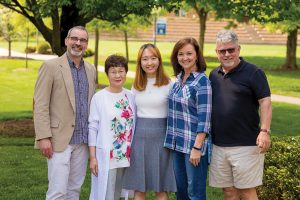
In spring 2018, a restorative justice process was used in a groundbreaking felony case in North Carolina.
YoungJi Jang was involved in facilitated dialogue for the case as part of her practicum placement at the Restorative Justice Clinic (RJC) at Campbell Law School in Raleigh. [Jang graduated in May 2018.]
Jang said the case prompted “tears of happiness” and hugs, including for the offender from Judge Elaine O’Neal, who said following the case, “What does justice look like? Each of the people in this room might have different idea about what it looks like. However, this morning we know what it feels like.”
In March 2017, a bullet fired by James Scott Berish struck Deisy, a 10-year-old girl sleeping in a lower apartment in Durham. Berish initially fled the scene, but when he learned of the injury, Berish – the father of a two-year-old daughter – turned himself in to police.
The prosecuting attorney assigned to the case had attended an RJC restorative justice training, and realized this case was suited to the process, said RJC director Jon Powell.
“Restorative justice is a theory of justice that recognizes that crime and wrongdoing does not only violate laws of the state but that it damages people, relationships and communities,” Powell told news reporters. “If crime creates harm, justice ought to create healing and that’s what we witnessed in this case.”
At a meeting during the week before the sentencing hearing, Berish apologized to his victim and was offered forgiveness. He had learned that she loved art, and so brought art supplies for her.
Berish could have faced over 10 years in prison for the shooting and possession of a stolen gun. Now, however, as part of the plea deal resulting from the year-long restorative justice process, he is to pay restitution to cover the costs of counseling, lost work time, and a new bed for the victim’s family. He will also speak at gun safety events, provide another child victim of gun violence with art supplies, never again own a weapon, and be on probation for up to two years, according to news reports.
Assistant district attorney Kendra Montgomery-Blinn told media that the process was part of a “sea change coming.”
“What I see in Mr. Berish is a man taking full responsibility, a man who made a mistake and owns it,” she said. “What I see in Deisy and her family is a family who was wounded physically and emotionally, a family who asked for healing, a family who got answers to their questions and a family who found peace and forgiveness.”